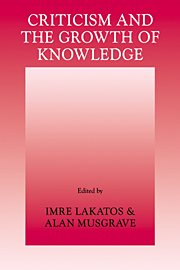 Criticism and the Growth of Knowledge
Criticism and the Growth of Knowledge Book contents
- Frontmatter
- Contents
- Preface
- Note on the Third Impression
- Logic of Discovery or Psychology of Research?
- Against ‘Normal Science’
- Does the Distinction between Normal and Revolutionary Science Hold Water?
- Normal Science, Scientific Revolutions and the History of Science
- Normal Science and its Dangers
- The Nature of a Paradigm
- Falsification and the Methodology of Scientific Research Programmes
- Consolations for the Specialist
- Reflections on my Critics
- Index
- References
Logic of Discovery or Psychology of Research?
Published online by Cambridge University Press: 05 August 2014
- Frontmatter
- Contents
- Preface
- Note on the Third Impression
- Logic of Discovery or Psychology of Research?
- Against ‘Normal Science’
- Does the Distinction between Normal and Revolutionary Science Hold Water?
- Normal Science, Scientific Revolutions and the History of Science
- Normal Science and its Dangers
- The Nature of a Paradigm
- Falsification and the Methodology of Scientific Research Programmes
- Consolations for the Specialist
- Reflections on my Critics
- Index
- References
Summary
My object in these pages is to juxtapose the view of scientific development outlined in my book, The Structure of Scientific Revolutions, with the better known views of our chairman, Sir Karl Popper. Ordinarily I should decline such an undertaking, for I am not so sanguine as Sir Karl about the utility of confrontations. Besides, I have admired his work for too long to turn critic easily at this date. Nevertheless, I am persuaded that for this occasion the attempt must be made. Even before my book was published two and a half years ago, I had begun to discover special and often puzzling characteristics of the relation between my views and his. That relation and the divergent reactions I have encountered to it suggest that a disciplined comparison of the two may produce peculiar enlightenment. Let me say why I think this could occur.
On almost all the occasions when we turn explicitly to the same problems, Sir Karl's view of science and my own are very nearly identical. We are both concerned with the dynamic process by which scientific knowledge is acquired rather than with the logical structure of the products of scientific research. Given that concern, both of us emphasize, as legitimate data, the facts and also the spirit of actual scientific life, and both of us turn often to history to find them. From this pool of shared data, we draw many of the same conclusions.
- Type
- Chapter
- Information
- Criticism and the Growth of KnowledgeProceedings of the International Colloquium in the Philosophy of Science, London, 1965, pp. 1 - 24Publisher: Cambridge University PressPrint publication year: 1970
References
- 217
- Cited by


